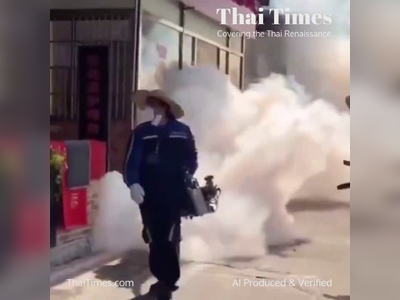Tragic Death of Thai Singer Sparks Scrutiny of Massage Practices
Chayada Prao-hom's untimely demise after massage sessions raises questions over standards in traditional Thai massage services
The passing of Chayada Prao-hom, a celebrated practitioner of luk thung and mor lam music, has cast a spotlight on the potential risks associated with Thai massage practices.
The singer, known fondly as part of Guitar Record, succumbed to complications from a blood infection and brain swelling, reported at an Udon Thani hospital on Sunday morning.
Her death followed three visits to a local Thai massage shop, two of which included neck massages, a detail that has since become central to the investigation of the events surrounding her demise.
Chayada's boyfriend, who has chosen to remain unnamed, recounted the initial signs of Chayada's ailments following her Oct 5 performance.
Awakening to a backache, she sought relief at a Thai massage shop.
However, post-massage symptoms escalated alarmingly, beginning with numbness advancing from her left arm to an inability to move her entire body.
In her communication with concerned fans via Facebook, Chayada admitted to frequenting the same establishment thrice over the span of a month.
Her account reveals a pattern; during the first two visits, she underwent a neck manipulation exercise known colloquially as 'a neck twist'.
On her final visit, under the care of a different masseuse, her condition took a severe turn, with considerable swelling and bruising marking her body.
Chayada, who held a deep appreciation for massage—her mother being a skilled masseuse and herself trained since childhood—was initially unsuspicious of the massages being the source of her debilitating condition.
Alas, what began as discomfort progressed rapidly to full-body stiffness, pain, and eventually paralysis of significant portions of her body.
Her tragic narrative echoes with warnings voiced by Prof Dr Thiravat Hemachudha, advisor to the College of Oriental Medicine at Rangsit University.
The risks inherent in high-force neck manipulations—actions that might compromise the carotid and vertebral arteries, leading to potentially lethal outcomes such as stroke—underscore the dire need for rigorous adherence to professional standards in the practice of traditional Thai massage.
In the wake of Chayada's death, her grieving boyfriend has contemplated legal action against the massage shop, though he concedes evidence may be sparse.
Concurrently, Arkom Praditsuwan, deputy director-general of the Department of Health Service Support, announced an inquiry into the legitimacy and certification of the spa in question.
"It is critical to ascertain that services provided align with the codified practices of Thai traditional massage," declared Praditsuwan, hinting at the broader implications for the industry if non-compliance is detected.
This incident not only raises serious questions about the regulation of massage parlours in Thailand but also serves as a stark reminder of the physical risks posed by improper practice in the wellness and alternative medicine sectors worldwide.
As investigations continue, Chayada's heartfelt last words urging caution to massage enthusiasts resonate poignantly—a clarion call for greater vigilance and accountability.
The singer, known fondly as part of Guitar Record, succumbed to complications from a blood infection and brain swelling, reported at an Udon Thani hospital on Sunday morning.
Her death followed three visits to a local Thai massage shop, two of which included neck massages, a detail that has since become central to the investigation of the events surrounding her demise.
Chayada's boyfriend, who has chosen to remain unnamed, recounted the initial signs of Chayada's ailments following her Oct 5 performance.
Awakening to a backache, she sought relief at a Thai massage shop.
However, post-massage symptoms escalated alarmingly, beginning with numbness advancing from her left arm to an inability to move her entire body.
In her communication with concerned fans via Facebook, Chayada admitted to frequenting the same establishment thrice over the span of a month.
Her account reveals a pattern; during the first two visits, she underwent a neck manipulation exercise known colloquially as 'a neck twist'.
On her final visit, under the care of a different masseuse, her condition took a severe turn, with considerable swelling and bruising marking her body.
Chayada, who held a deep appreciation for massage—her mother being a skilled masseuse and herself trained since childhood—was initially unsuspicious of the massages being the source of her debilitating condition.
Alas, what began as discomfort progressed rapidly to full-body stiffness, pain, and eventually paralysis of significant portions of her body.
Her tragic narrative echoes with warnings voiced by Prof Dr Thiravat Hemachudha, advisor to the College of Oriental Medicine at Rangsit University.
The risks inherent in high-force neck manipulations—actions that might compromise the carotid and vertebral arteries, leading to potentially lethal outcomes such as stroke—underscore the dire need for rigorous adherence to professional standards in the practice of traditional Thai massage.
In the wake of Chayada's death, her grieving boyfriend has contemplated legal action against the massage shop, though he concedes evidence may be sparse.
Concurrently, Arkom Praditsuwan, deputy director-general of the Department of Health Service Support, announced an inquiry into the legitimacy and certification of the spa in question.
"It is critical to ascertain that services provided align with the codified practices of Thai traditional massage," declared Praditsuwan, hinting at the broader implications for the industry if non-compliance is detected.
This incident not only raises serious questions about the regulation of massage parlours in Thailand but also serves as a stark reminder of the physical risks posed by improper practice in the wellness and alternative medicine sectors worldwide.
As investigations continue, Chayada's heartfelt last words urging caution to massage enthusiasts resonate poignantly—a clarion call for greater vigilance and accountability.











